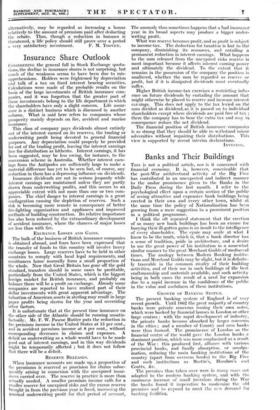Insurance Share Outlook
CONSIDERING the general fall in Stock Exchange quota- tions, the decline in insurance shares is not surprising, but much of the weakness seems to have been due to mis- apprehensions. Holders were frightened -by depreciation and talk of a tax on fixed interest bearing securities. Calculations were made of the probable results on the basis of the large investments of British insurance com- panies, and it was forgotten that the greater part of these investments belong to the life department in which the shareholders have only a slight concern. Life assur- ance is a distinct business which is discussed in another column. What is said here refers to companies whose prosperity mainly depends on fire, accident and marine insurance.
This class of company pays dividends almost entirely out of the interest earned on its reserves, the trading or underwriting profit being devoted to general financial purposes. Any depreciation could properly be provided for out of the trading profit, leaving the interest earnings free for distribution as hitherto. Interest earnings, it has been suggested, may be less owing, for instance, to the conversion scheme in Australia. Whether interest earn- ings from the Antipodes are sufficiently large to make a material difference has yet to be seen but, of course, any reduction in them has a depressing influence on dividends.
Insurance dividends are not in serious jeopardy while interest earnings are maintained unless they are partly drawn from underwriting profits, and this occurs to an appreciable extent with not more than one or two com- panies. The chief danger to interest earnings is a great conflagration causing the depletion of reserves. Such a risk is becoming more remote in consequence of better fire-fighting organization and appliances and improved methods of building construction. Its relative importance has also been reduced by the extraordinary-development of accident insurance, where the chances of major losses are less than with fire.






































 Previous page
Previous page